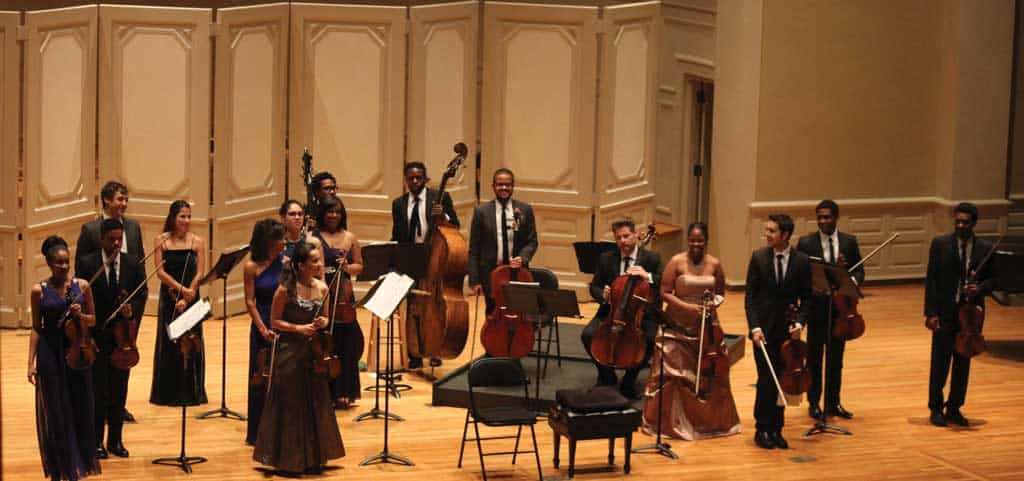A chamber string ensemble, The Sphinx Virtuosi with the Catalyst Quartet graced Swasey Chapel with their unique take on classical music, songs by diverse composers not frequently played by classical chamber groups, and with their conductor-less existence and performance.
Last Tuesday, Nov. 5th, The Sphinx Virtuosi ensemble played for and commanded attention from a good number of the Granville community as well as Denison faculty and students. While Tuesday nights are not prime time for a Vail Series concert, the performance still garnered attention from the surrounding community, and Swasey only had different veins of spots left to trickle into by the time intermission came around. Members of the audience seemed to very much enjoy the performance, and the performers received a standing ovation.
The Denisonian had the opportunity to attend a panel with the Catalyst Quartet performer to learn more about Sphinx Virtuosi and its set list. The Sphinx Virtuosi ensemble is made up of soloists who are all alumni of the Sphinx Competition for Black and Latino string players and who play classical pieces of music as well as pieces by Black and Latino composers who, violinist and composer Jessie Montgomery said, “you don’t find anywhere.” Their perfomance at Denison included three competition winners who are part of the ensemble, yet not yet alumni, and also had solos (Violinist Ade Williams, Cellists Gabriel Cabezas and Christine Lamprea). Ben Hsiung, a political science and communication double major from Huntingdon, PA., stated that his “favorite piece was the ‘Louisiana Blues Strut: A Cakewalk’ performed by the junior Sphinx winner. She played very well and with feeling.”
The program was founded in 1997 as a national string competition at the University of Michigan to challenge diversity and has since morphed into more than just a competition. The performers and essentially organizers use the ensemble as a form of community and outreach and, in a sense, a way to activate thought on diversity in the musical realm. The crux of the program is the competition for younger Black and Latino string players in two different stretches of age (junior and senior).
The Catalyst Quartet works toward A common goal and is more dedicated to the education of contemporary works as well as the performance of these new works. The Catalyst Quartet is specifically made up of musicians who are devoted to their passion for playing and the goal of Sphinx Virtuosi and are both a part of the Sphinx program and a professional string quartet.
The ensembles are both dedicated to the advancement of diversity in performance of pieces by multiracial composers, and in identifying and nurturing classical Black or Latino performers. In the panel, principal cellist Karlos Rodriguez said that the Sphinx Virtuosi program is a “program that reflects America” and that it works “to promote the music of these other cultures.”
The performance included various pieces from very classical composers like Bach and Vivaldi to more modern composers like Perkinson and Britten. A very special addition to the set list was the addition of classical composers of Black and Latino identification. Rodriguez said that “sometimes the group “[has] run up against conservative directors” and that they do realize that they “have to be inclusive” of older classical pieces, but that “the program is so dynamic and colorful and rich.” Concertmaster violinist Karla Donchew Perez stated that she thanks “many of our audience members are surprised by what they like,” and are especially surprised by the order in which things pop up in a set list and how they enjoy the contrasts of musical settings.
The performers emphasized the amount of work they put into creating a program that was both classical and inclusive of other cultures. There was also a sense of pride not only in their own interpretations of the music they were to perform, but also in what performing that music meant and the “opportunities it holds for younger generations,” according to violist Paul Laraia.
Laraia said that “it’s hard to change minds, it’s hard to change musical lanscapes,” and that is definitely a higher goal that the Sphinx Virtuosi is working towards and is achieving in giant strides and with increased exposure. The performers play with an unprecedented passion for their music and their rigor as musicians. Speaking to the musicians and watching and hearing them play was a truly refreshing and inspiring experience.

